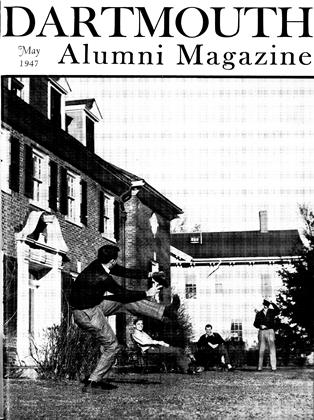by Lawrence B. Wallis '18 King's Crown Press,N. Y., 1947. xiv-315 pp. $3.75.
Here at last is a much needed book in its field. As Prof. Wallis implies by the title, his impressive study revises the status of each member in the partnership. More importantly it argues for a sympathetic appreciation of their artistic aims. He commands a wealth of reference to all that is known about the group and also about the changing theatrical world for which they wrote. Never has this great task been so thoroughly done, or the tangle of the collaboration, and of the critic ism following it to the present day, been so clearly presented. He is willing to concede to Beaumont precedence as poetic stylist, but he realigns a fund of scattered information to show that Fletcher was the active deviser of the company's play pattern, and to prove that it was consciously developed to appeal to the gentry patronizing the private theatres and the King's players. Incidentally he throws new light on the unsolved problem as to who was first in the field: Shakespeare or Fletcher.
He substitutes for the terms "degenerate," "mechanical/' and "melodramatic," that have caused undue disparagement, the more significant phrase "emotional form," which he thinks more justly denotes Fletcher's purpose and artistry, and he shows by careful analysis of the plays that this was a dramatic contribution similar to the "well-made" technique of the past century. By abundant evidence he proves that it had its intended affect on the public and critics of the cavalier periods. He frankly admits the faults involved, but insists that Fletcher was a master-craftsman in relation to his "time-space." Prof. Wallis has made a sane, stimulating, and readable contribution to Jacobean scholarship.
 View Full Issue
View Full Issue
More From This Issue
-
 Article
ArticleTHE ALASKA HIGHWAY
May 1947 By LAURENCE W. LOUGEE '29 -
 Article
ArticlePROPAGANDA AND THE CRISIS
May 1947 By MICHAEL E. CHOUKAS '27 -
 Class Notes
Class Notes1918
May 1947 By ERNEST H. EARLEY, DONALD L. BARR -
 Article
ArticleJames Parmelee Richardson
May 1947 By JOSEPH W. GANNON '99 -
 Class Notes
Class Notes1921
May 1947 By DONALD G. MIX, ROBERT M. MACDONALD -
 Class Notes
Class Notes1937
May 1947 By JOHN H. DEVLIN, ARTHUR H. RUGGLES JR.
E. Bradlee Watson '02
-
 Article
ArticleThe Fifty-Year Address
July 1952 By E. BRADLEE WATSON '02 -
 Books
BooksSAGE OF THE SACRED MOUNTAIN.
March 1954 By E. BRADLEE WATSON '02 -
 Books
BooksTHE MAGNIFICENT PARTNERSHIP.
March 1955 By E. BRADLEE WATSON '02 -
 Class Notes
Class NotesThe 55th Reunion of 1902
July 1957 By E. BRADLEE WATSON '02 -
 Books
BooksTHE JADE NECKLACE OF LIN SAN KWEI.
MARCH 1959 By E. BRADLEE WATSON '02
Books
-
 Books
BooksAlumni Articles
NOVEMBER 1969 -
 Books
BooksMODERN BOOK COLLECTING FOR THE IMPECUNIOUS AMATEUR
October 1936 By Harold Goddard Rugg '06 -
 Books
BooksALL THE BEST IN ENGLAND,
April 1948 By HERBERT F. WEST '22. -
 Books
BooksLANDMARKS: A BOOK OF SONNETS AND OTHER POEMS.
October 1954 By JOHN HURD '21 -
 Books
BooksREFLECTIONS ON THINGS AT HAND, THE NEO-CONFUCIAN ANTHOLOGY, COMPILED BY CHU HSI & LÜ-CHTEN.
NOVEMBER 1967 By T.S.K. SCOTT-CRAIG -
 Books
BooksBUSINESS RESEARCH AND REPORT WRITING.
JUNE 1965 By WILLIAM M. SAYRE '37, T'38

